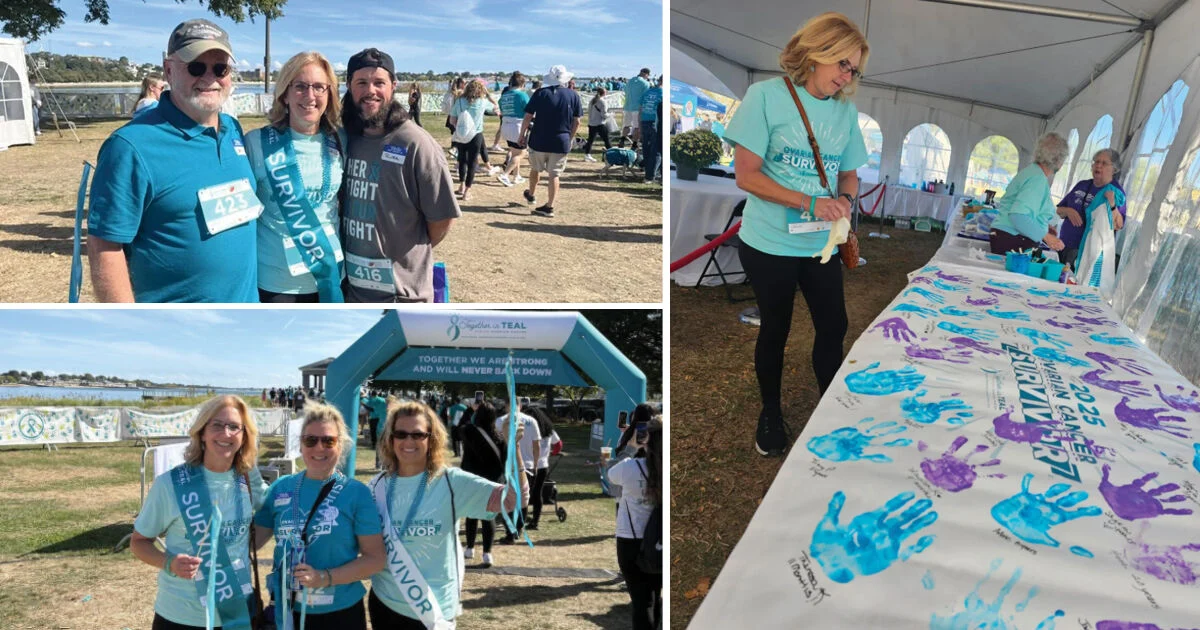By By Dylan Thompson,The Berkshire Eagle
Copyright berkshireeagle

BOSTON — Christine Croughwell has often felt alone since being diagnosed with stage 4 ovarian cancer.
Now four years cancer-free, Croughwell has struggled to find other Berkshire County residents who’ve been diagnosed or survived, as most people seek treatment in Boston or at Baystate Medical Center, she said.
Croughwell, seeking a community atmosphere, decided to go to the National Ovarian Cancer Coalition’s Together in Teal walk on Sunday in Boston. The walk and setting was worth the trip.
“It was very inspiring,” Croughwell said. “It was great to be there and be with everybody who is going through the same thing.”
Croughwell, a Dalton resident, is one of many women who have been diagnosed with ovarian cancer — the deadliest of all gynecologic cancers — and among those pushing for more research. September is Ovarian Cancer Awareness Month, dedicated to raising awareness about ovarian cancer and promoting early detection.
“It’s important to put the word out about the symptoms and signs of ovarian cancer because they mimic other conditions,” Croughwell said.
Ovarian cancer occurs when abnormal cells in the ovaries grow out of control and divide into new abnormal cells. Common signs and symptoms include bloating, pelvic or abdominal pain, trouble eating and feeling the need to urinate more often.
Ovarian cancer can mimic menopause or gastrointestinal problems, Croughwell said, adding, “You can ignore [the symptoms] for a long time thinking they’ll go away.”
The walk in Boston was among 11 that the National Ovarian Cancer Coalition is putting on from September to November. The Boston event had a fundraising goal of $400,000, and as of Monday afternoon had raised $393,906.
Croughwell raised $1,005 through a Facebook post. She added that she received more donations after writing a letter to the editor that ran in The Eagle on Sept. 18.
Together in TEAL events bring survivors, caregivers and families together to raise awareness of ovarian cancer symptoms, celebrate the strength and resilience of those impacted, honor loved ones lost and fuel education and research, according to the National Ovarian Cancer Coalition.
Teal is the official color of ovarian cancer awareness, representing courage, strength and hope.
Croughwell was diagnosed with stage 4 ovarian cancer in January 2021, during the height of the COVID-19 pandemic. Stage 4 ovarian cancer is when the cancer has spread to lymph nodes outside the abdomen or to inside the lungs, spleen, liver or brain.
There was fluid in the pleural area of her lung, which didn’t show up until she had a CT scan because she was having abdominal pain, she said. Currently, there is no early detection test or screening for ovarian cancer, and only 20 percent of ovarian cancer cases are detected early, according to the National Ovarian Cancer Coalition.
Croughwell began her chemotherapy treatment in February of that year, and after three months, she was set to have surgery, but they found a blood clot in her left lung.
Despite the blood clot, the doctors found that the cancer had melted away, Croughwell said, adding that she had the surgery in August and was then cancer-free.
In 2025, about 20,890 women will receive a new diagnosis of ovarian cancer, and about 12,730 women will die from ovarian cancer, according to the American Cancer Society. Ovarian cancer is the 11th most common cancer among women and the fifth leading cause of cancer-related death among women.
Following the surgery, Croughwell started on a maintenance drug or trial, Lynparza, which she took for two years. The trial worked, she said, adding that she currently does not take anything.
With ovarian cancer having an 80 to 90 percent chance of recurrence, Croughwell said trials like the one she participated in are crucial. In March, Congress approved a funding resolution for the rest of fiscal year 2025 that included cutting the Ovarian Cancer Research Program from $45 million to $15 million, a 67 percent decrease in funding.
President Donald Trump’s proposed budget for the next fiscal year calls for a more-than-37-percent cut to the National Cancer Institute, reducing it from $7.2 billion to $4.5 billion, according to the New York Times.
Croughwell is not happy with the cuts and said the trials need to continue being funded.
“These trials extend women’s lives,” she said. “If this research goes away, more women could die.”
Croughwell considers herself a thriver.
“I’m being positive and taking on what I can to help bring awareness to this awful disease,” she said.
Croughwell is hoping to start an outreach program in Berkshire County and she is working with Danielle Sullivan, New England Regional Manager of the National Ovarian Cancer Coalition. Croughwell said that there may be some women receiving treatment at the Phelps Cancer Center in Pittsfield, but it’s hard to find people who have the disease and is hoping to get people more involved.
Croughwell, who is hopeful she will remain cancer free, said she has appointments at the Dana-Farber Cancer Institute every six months.
“I try not to dwell on it,” she said. “I get nervous before my appointments … I’m not afraid every day anymore like I used to be.”



